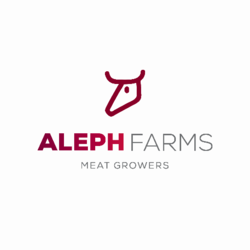Aleph Farms
Aleph Farms is a food-tech startup that grows meat cuts from beef cells using a 3D tissue engineering platform. The company was co-founded in 2017 with the Israeli food-tech incubator “The Kitchen” of Strauss Group Ltd., and the Technion – Israel Institute of Technology[1] and is headquartered in Rehovot, Israel.[2][3][4][5]
 | |
| Type of business | Private |
|---|---|
| Founded | 2017 |
| Headquarters | Rehovot, Israel |
| CEO | Didier Toubia |
| Key people | Professor Shulamit Levenberg of the Technion |
| Industry | Food Technology |
| URL | aleph-farms.com |
History
The technology of the company, which was co-developed with Prof. Shulamit Levenberg from the Technion, is based on a process naturally occurring in cows to regrow and build muscle tissue.[6][7] The company isolates the cells responsible for this process and grows them in the same conditions as inside the cow, to form muscle tissue typical to steaks. [8][9][10]
Emerging from the field of regenerative medicine, cell samples are used to grow tissues and whole organs for transplanting into the human body. With cultivated meat, the samples are being used to grow fat and muscle tissues for food purposes.
The company developed a technique that enables different cell types to grow together; fat cells with cells from blood vessels, muscles and supporting cells. The cells are then grown on a scaffold, which is a supportive structure- allowing them to form three-dimensional muscle tissue.
In December 2018, Aleph Farms released its prototype, a steak grown directly from bovine cells.[11][12]
In May 2019, the company announced a US$12M funding round led by Vis Vires New Protein. Other investors includes Cargill and M-Industry (Industrial Group of Migros).[13] In November 2019, Aleph Farms indicated its current production costs of cultured beef were over 3000 US dollars per kilogram, hoping to reduce it enough to enter the market by 2023.[14] In April 2020, it reportedly wanted to start building its first pilot plant in 2021, expecting it to be operational and sells its first cultivated meat cuts to restaurants and food service outlets by the end of 2022.[15]
The technology
In order to grow the meat without the need for raising livestock, a small amount of cells is extracted from an animal through a small biopsy and is placed afterward in a broth of nutrients. The cells then multiply, differentiate and form the same tissue as inside the animal's body.
The company developed a technique that enables different cell types to grow together; fat cells with cells from blood vessels, muscles and supporting cells. The cells are then grown on a scaffold, which is a supportive structure - allowing them to form three-dimensional muscle tissue.
To mimic the natural environment and the 3D structure, cultivated meat companies and Aleph Farms in particular, use a scaffold which is required to achieve the appropriate characteristics that allow cell adhesion and subsequent proliferation and tissue development.[16][17]
The extent to which the biology of the muscle is replicated, determines the complexity of the tissue engineering process that must be utilised. A like-for-like piece of muscle (e.g. steaks) requires a system containing multiple cell types growing in an organized manner, as well as a structure that needs a replicated blood vessel network.[18]
References
- Eytan Halon (28 May 2019). "INTERNATIONAL PARTNERSHIP TO INVEST $100M. IN ISRAELI FOODTECH INNOVATION". The Jerusalem Post.
- Amir Mizroch (3 December 2018). "Something Big Is Cooking In Israel's Food Tech Kitchen". Forbes.
- Laura Brehaut (17 December 2018). "Raising the steaks: An Israeli start-up just made the first slaughter-free steak, a lab-grown sirloin". National post.
- Al Root (14 May 2018). "Beyond Meat and Impossible Foods Could Be the Coke and Pepsi of Alternative Meat". Barrons.
- Shira Feder (18 December 2018). "This Israeli Lab Has Produced Steak, Hold The Cow". The Forward.
- Arshad, Muhammad Sajid; Javed, Miral; Sohaib, Muhammad; Saeed, Farhan; Imran, Ali; Amjad, Zaid (2017). "Tissue engineering approaches to develop cultured meat from cells: A mini review". Cogent Food & Agriculture. 3. doi:10.1080/23311932.2017.1320814.
- Ben-Arye, Tom; Levenberg, Shulamit (2019). "Tissue Engineering for Clean Meat Production". Frontiers in Sustainable Food Systems. 3. doi:10.3389/fsufs.2019.00046.
- Hasan Chowdhury (6 May 2019). "Made without humans or cows: inside the race to bioengineer milk". Telegraph.
- Erin Brodwin (15 December 2018). "An Israeli startup with ties to America's most popular hummus brand says it made the world's first lab-grown steak — a holy grail for the industry". Business Insider.
- Jason Bellini (11 December 2018). "From Grass-Fed to Lab-Grown: How Meat Is Evolving". The Wall Street Journal.
- "World's first lab-grown steak revealed – but the taste needs work". The Guardian. 2018-12-14. Retrieved 14 December 2018.
- Niall Firth (27 February 2019). "The race to make a lab-grown steak". MIT Technology Review.
- "Israeli Startup Aleph Farms Raises $11.65 Million To Create Steaks". Forbes. Retrieved 14 May 2019.
- Dieter De Cleene (12 November 2019). "Wanneer ligt kweekvlees op ons bord?". Eos Wetenschap (magazine) (in Dutch). Retrieved 26 May 2020.
- Oliver Morrison (29 April 2020). "'Cultivated meat will become a necessity': Aleph Farms discusses its commitment to net-zero emissions". Food Navigator. Retrieved 27 May 2020.
- Chan, B. P.; Leong, K. W. (2008). "Scaffolding in tissue engineering: general approaches and tissue-specific considerations". European Spine Journal. 17: 467–479. doi:10.1007/s00586-008-0745-3. PMC 2587658. PMID 19005702.
- Vandenburgh, Herman H.; Karlisch, Patricia; Farr, Lynne (1988). "Maintenance of highly contractile tissue-cultured avian skeletal myotubes in collagen gel". In Vitro Cellular & Developmental Biology. 24 (3): 166–174. doi:10.1007/BF02623542. PMID 3350785.
- Stephens, Neil; Di Silvio, Lucy; Dunsford, Illtud; Ellis, Marianne; Glencross, Abigail; Sexton, Alexandra (2018). "Bringing cultured meat to market: Technical, socio-political, and regulatory challenges in cellular agriculture". Trends in Food Science & Technology. 78: 155–166. doi:10.1016/j.tifs.2018.04.010. PMC 6078906. PMID 30100674.